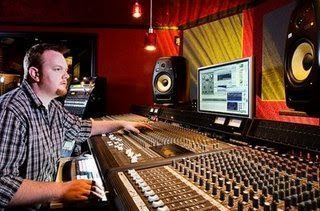 It’s very important as an engineer to always remain passionate about your job. I’m sure you could talk to a million bands, and get a million different stories about how they recorded with some jerk engineer in some crappy, or even nice, studio that was just going through the motions. They’ve either been at it too long, or are bitter that they never ended up recording U2 or Green Day or they’ve just taken for granted that they have one of the greatest jobs on earth. If you get up in the morning and the worst part of your day is saying, “aw crap, I have to go record music today”, then you’re doing pretty damn good. I think that there are a lot of people in my line of work that forget that, and forget that the reason they started doing this is that they love music (or at least that should have been the main reason).
It’s very important as an engineer to always remain passionate about your job. I’m sure you could talk to a million bands, and get a million different stories about how they recorded with some jerk engineer in some crappy, or even nice, studio that was just going through the motions. They’ve either been at it too long, or are bitter that they never ended up recording U2 or Green Day or they’ve just taken for granted that they have one of the greatest jobs on earth. If you get up in the morning and the worst part of your day is saying, “aw crap, I have to go record music today”, then you’re doing pretty damn good. I think that there are a lot of people in my line of work that forget that, and forget that the reason they started doing this is that they love music (or at least that should have been the main reason).I get that the job can become monotonous, routine, and even boring at times but you have to always keep the big picture in mind. You, as an engineer, are helping to create music. There aren’t many greater things to be a part of, and if you don’t agree with that then you might want to consider a career change. Even if the genre of the artist you’re recording is something that is completely not up your alley, there's always something to find in it that you enjoy. Whether it’s the singers voice, a cool beat, a great arrangement, a killer guitar player or just a small little piano melody that makes your heart go a pitter-patter, there’s always something to find in the music that will keep you motivated if you care enough to look.
Bands know when the engineer is not into it, and not into what they’re doing. It brings down their excitement and hurts the final product. Don’t be that person. Don’t be the leech that sucks all the passion out of a project. Take pride in what you do, and never ever forget how lucky you are to be doing it.
kyle@artisanslabel.com














